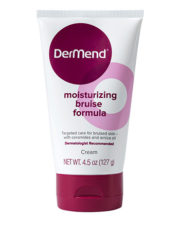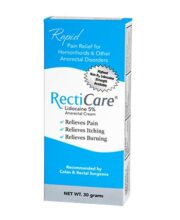PRESS RELEASE ON 11/16/2012
Ferndale, MI — A hemorrhoid can change your life . . . for the worse! It can, and usually does, manage to interfere with almost everything you do, from something as simple as sitting on a bus to enjoying a meal out with friends.
If you suspect you have a hemorrhoid or have confirmed this with your doctor and have a treatment plan, here’s an over the counter product you may want to add to increase your comfort and help restore your quality of life. Ferndale Healthcare® has just launched RectiCare® (Lidocaine 5%) Anorectal Cream, a topical, local anesthetic, which contains the highest non-prescription strength of lidocaine available. It works very quickly to relieve pain, itching and burning associated with hemorrhoids and other anorectal disorders. Each tube of RectiCare® Cream comes with a supply of “finger cots,” little covers that fit over the finger. They promote hygienic application, since the finger (skin) doesn’t come into contact with the product or the area to which it’s being applied.
What Causes Hemorrhoids?
Most colon-rectal doctors, obstetricians and gastroenterologists agree that hemorrhoids are usually caused by increased pressure on the veins in the pelvic and rectal area. As this pressure increases, blood pools in veins, causing them to swell. Eventually, the swollen veins stretch the surrounding tissue, and a hemorrhoid develops. It can be located inside (internal) the rectum or outside (external). External hemorrhoids more commonly cause symptoms of pain and itching when irritated. Internal hemorrhoids generally are painless but can cause bleeding.
So, what you can you do to help prevent or lessen the discomfort of a hemorrhoid?
- Don’t rush to complete a bowel movement. Rushing and pushing can cause excessive straining and increase pressure on rectal veins.
- Ask your doctor if you have persistent diarrhea or constipation. These may contribute to straining and increase pressure on veins in the anal canal.
- Excess weight in your abdomen can be a factor.
- Pregnancy and labor may produce hemorrhoids. Hormonal changes during pregnancy increase blood flow to the pelvis and relax supportive tissues while the growing fetus causes increased pressure on blood vessels. During labor, hemorrhoids may develop because of the intense pressure on the anal area while pushing to deliver the baby. This may be unavoidable, but make sure to speak with your obstetrician to help get hemorrhoids under control after birth. If you have hemorrhoids before you get pregnant, you may also want to discuss some treatment options with your doctor.
Whatever caused your hemorrhoid, if it is bothering you, get much needed relief with products like RectiCare® Cream. Available at drugstores without a prescription.
Visit www.recticare.com for more information.


